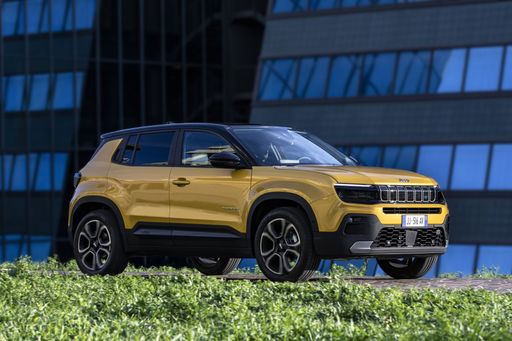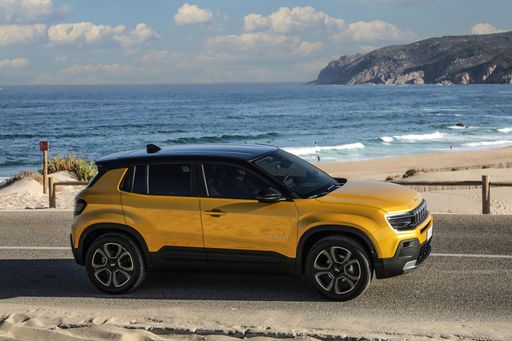Jeep Avenger vs Nissan Leaf - Differences and prices compared
Compare performance (156 HP vs 217 HP), boot space and price (21900 £ vs 30800 £ ) at a glance. Find out which car is the better choice for you – Jeep Avenger or Nissan Leaf?
Costs and Efficiency:
When it comes to price and running costs, the biggest differences usually appear. This is often where you see which car fits your budget better in the long run.
Jeep Avenger has a significantly advantage in terms of price – it starts at 21900 £ , while the Nissan Leaf costs 30800 £ . That’s a price difference of around 8829 £.
In terms of energy consumption, the advantage goes to the Jeep Avenger: with 15.50 kWh per 100 km, it’s hardly perceptible more efficient than the Nissan Leaf with 16.70 kWh. That’s a difference of about 1.20 kWh.
As for electric range, the Jeep Avenger performs hardly perceptible better – achieving up to 400 km, about 15 km more than the Nissan Leaf.
Engine and Performance:
Under the bonnet, it becomes clear which model is tuned for sportiness and which one takes the lead when you hit the accelerator.
When it comes to engine power, the Nissan Leaf has a noticeable edge – offering 217 HP compared to 156 HP. That’s roughly 61 HP more horsepower.
In acceleration from 0 to 100 km/h, the Nissan Leaf is evident quicker – completing the sprint in 6.90 s, while the Jeep Avenger takes 9 s. That’s about 2.10 s faster.
In terms of top speed, the Jeep Avenger performs a bit better – reaching 194 km/h, while the Nissan Leaf tops out at 157 km/h. The difference is around 37 km/h.
There’s also a difference in torque: Nissan Leaf pulls evident stronger with 340 Nm compared to 260 Nm. That’s about 80 Nm difference.
Space and Everyday Use:
Beyond pure performance, interior space and usability matter most in daily life. This is where you see which car is more practical and versatile.
Both vehicles offer seating for 5 people.
In curb weight, Jeep Avenger is evident lighter – 1180 kg compared to 1580 kg. The difference is around 400 kg.
In terms of boot space, the Nissan Leaf offers hardly perceptible more room – 394 L compared to 380 L. That’s a difference of about 14 L.
In maximum load capacity, the Jeep Avenger performs evident better – up to 1277 L, which is about 487 L more than the Nissan Leaf.
When it comes to payload, Jeep Avenger somewhat takes the win – 502 kg compared to 415 kg. That’s a difference of about 87 kg.
Who wins the race in the data check?
The Jeep Avenger holds a narrow overall lead in the objective data comparison.
This result only shows which model scores more points on paper – not which of the two cars feels right for you.
Costs and Consumption
View detailed analysis
Engine and Performance
View detailed analysis
Dimensions and Body
View detailed analysis

Jeep Avenger
Jeep Avenger
The Jeep Avenger shrinks Jeep's boxy, adventurous styling into a city-friendly electric crossover that looks just as at home on tight streets as it does on muddy weekend lanes. It's a savvy pick for drivers who want go-anywhere attitude without the truck-size ego — practical inside, lively around town and ready to tackle a bit of rough stuff when the mood strikes.
details




Nissan Leaf
The Nissan Leaf is a practical, easygoing electric hatch that turns daily commutes into a quiet, effortless affair while offering more cabin space than it lets on. It’s a sensible, wallet-friendly step into electrification for buyers who value comfort and simplicity over sporty drama, though those chasing long-distance thrills might look elsewhere.
details



Costs and Consumption |
|
|---|---|
|
Price
21900 - 36900 £
|
Price
30800 - 37200 £
|
|
Consumption L/100km
4.9 - 5.7 L
|
Consumption L/100km
-
|
|
Consumption kWh/100km
15.50 kWh
|
Consumption kWh/100km
16.7 - 17.8 kWh
|
|
Electric Range
400 km
|
Electric Range
270 - 385 km
|
|
Battery Capacity
51 kWh
|
Battery Capacity
39 - 59 kWh
|
|
co2
0 - 129 g/km
|
co2
0 g/km
|
|
Fuel tank capacity
44 L
|
Fuel tank capacity
-
|
Dimensions and Body |
|
|---|---|
|
Body Type
SUV
|
Body Type
Hatchback
|
|
Seats
5
|
Seats
5
|
|
Doors
5
|
Doors
5
|
|
Curb weight
1180 - 1520 kg
|
Curb weight
1580 - 1756 kg
|
|
Trunk capacity
325 - 380 L
|
Trunk capacity
385 - 394 L
|
|
Length
4084 - 4088 mm
|
Length
4490 mm
|
|
Width
1776 mm
|
Width
1788 mm
|
|
Height
1527 - 1541 mm
|
Height
1540 - 1545 mm
|
|
Max trunk capacity
1218 - 1277 L
|
Max trunk capacity
790 L
|
|
Payload
494 - 502 kg
|
Payload
384 - 415 kg
|
Engine and Performance |
|
|---|---|
|
Engine Type
Electric, Petrol, Petrol MHEV
|
Engine Type
Electric
|
|
Transmission
Automatic, Manuel
|
Transmission
Automatic
|
|
Transmission Detail
Reduction Gearbox, Manual Gearbox, Dual-Clutch Automatic
|
Transmission Detail
Reduction Gearbox
|
|
Drive Type
Front-Wheel Drive, All-Wheel Drive
|
Drive Type
Front-Wheel Drive
|
|
Power HP
100 - 156 HP
|
Power HP
150 - 217 HP
|
|
Acceleration 0-100km/h
9 - 10.6 s
|
Acceleration 0-100km/h
6.9 - 7.9 s
|
|
Max Speed
150 - 194 km/h
|
Max Speed
144 - 157 km/h
|
|
Torque
205 - 260 Nm
|
Torque
320 - 340 Nm
|
|
Number of Cylinders
3
|
Number of Cylinders
-
|
|
Power kW
74 - 115 kW
|
Power kW
110 - 160 kW
|
|
Engine capacity
1199 cm3
|
Engine capacity
-
|
General |
|
|---|---|
|
Model Year
2023 - 2025
|
Model Year
2019
|
|
CO2 Efficiency Class
A, D, C
|
CO2 Efficiency Class
A
|
|
Brand
Jeep
|
Brand
Nissan
|
What drivetrain options does the Jeep Avenger have?
Available configurations include Front-Wheel Drive or All-Wheel Drive.
